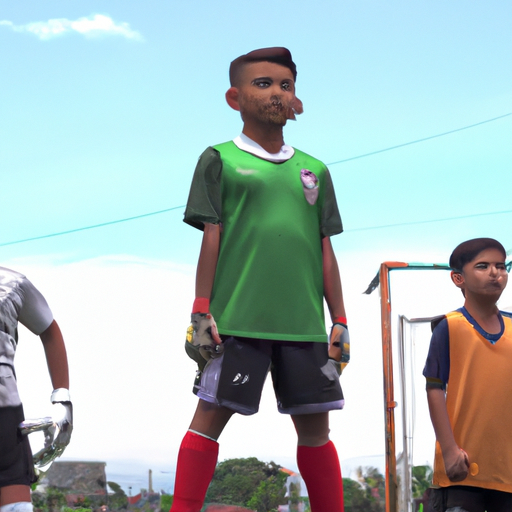Unearthing Filipino Football Talent: The Pathway to Success

The Importance of Grassroots Development in Unearthing Filipino Football Talent
The development of football talent in the Philippines has been a topic of discussion for many years. With the country’s passion for basketball and boxing, football has often taken a backseat in terms of popularity. However, in recent years, there has been a growing interest in the sport, and efforts have been made to unearth and nurture Filipino football talent.
One of the key factors in unearthing football talent is grassroots development. This refers to the process of identifying and nurturing young players from a young age, providing them with the necessary skills and opportunities to excel in the sport. Grassroots development is crucial because it lays the foundation for future success in football.
In the Philippines, grassroots development programs have been implemented by various organizations and football clubs. These programs aim to identify talented young players and provide them with the necessary training and support to develop their skills. They also focus on promoting the sport at the grassroots level, encouraging more children to take up football and providing them with opportunities to play and compete.
One of the main benefits of grassroots development is that it allows for the identification of talent at a young age. By starting the development process early, coaches and scouts can spot potential in young players and provide them with the necessary guidance and training. This early identification is crucial because it allows for the proper nurturing of talent, ensuring that young players reach their full potential.
Grassroots development also helps to create a strong foundation of skills and knowledge. By providing young players with the opportunity to learn and practice the fundamentals of the game, they can develop a solid understanding of the sport. This foundation is essential for future success, as it allows players to build upon their skills and develop more advanced techniques as they progress in their football journey.
Furthermore, grassroots development programs provide young players with valuable opportunities to play and compete. Through organized leagues and tournaments, young players can gain valuable experience and exposure to different playing styles and competition levels. This exposure is crucial for their development, as it helps them to grow and adapt to different situations on the field.
In addition to the benefits for individual players, grassroots development also has a positive impact on the overall growth of football in the Philippines. By promoting the sport at the grassroots level, more children are encouraged to take up football, leading to a larger pool of talent for the future. This increased interest in the sport also helps to raise the profile of football in the country, attracting more resources and support for its development.
In conclusion, grassroots development plays a crucial role in unearthing Filipino football talent. By starting the development process at a young age, identifying talent, and providing the necessary training and support, young players can reach their full potential in the sport. Grassroots development also benefits the overall growth of football in the Philippines, creating a larger pool of talent and raising the profile of the sport. With continued efforts and investment in grassroots development, the future of Filipino football looks promising.
Identifying and Nurturing Young Football Talent in the Philippines

Unearthing Filipino Football Talent: The Pathway to Success
Identifying and Nurturing Young Football Talent in the Philippines
Football, also known as soccer, is a sport that has gained immense popularity worldwide. In recent years, the Philippines has seen a surge in interest and participation in football. With this growing interest comes the need to identify and nurture young football talent in order to develop a strong national team and compete on the international stage.
Identifying young football talent is the first step in the pathway to success. Talent identification programs are crucial in identifying individuals with the potential to excel in the sport. These programs often involve scouting talented players from schools, local clubs, and grassroots football programs. Coaches and talent scouts look for specific attributes such as technical skills, physical abilities, tactical understanding, and mental strength. By identifying these young talents early on, they can be given the necessary support and training to reach their full potential.
Once young talents have been identified, it is important to provide them with the necessary resources and opportunities to develop their skills. This includes access to quality coaching, training facilities, and competitive matches. Football academies play a vital role in nurturing young talents by providing them with a structured training program and exposure to high-level competition. These academies often have partnerships with professional clubs, allowing talented players to be scouted by professional teams and potentially secure contracts.
In addition to football academies, grassroots football programs are also essential in nurturing young talents. These programs are often run by local communities or non-profit organizations and aim to provide access to football for children from all backgrounds. Grassroots programs not only help identify talented players but also serve as a platform for them to develop their skills in a supportive and inclusive environment. These programs often rely on volunteers and donations to provide equipment and coaching, making it crucial for the community to support and invest in grassroots football.
Furthermore, it is important to emphasize the importance of education alongside football development. Many young talents dream of becoming professional football players, but it is essential to have a backup plan in case their football career does not pan out. By prioritizing education, young talents can have a well-rounded development and a solid foundation for their future, whether it be in football or other fields.
The pathway to success for young Filipino football talents also involves exposure to international competitions. Participating in international tournaments allows young players to gain valuable experience and measure themselves against players from different countries. It also provides an opportunity for scouts from professional clubs to take notice of their talent. The Philippine Football Federation plays a crucial role in organizing and supporting the participation of national youth teams in international competitions, ensuring that young talents have the platform to showcase their skills on a global stage.
In conclusion, identifying and nurturing young football talent is crucial for the development of the sport in the Philippines. Talent identification programs, football academies, grassroots programs, and international exposure all play a vital role in unearthing and developing young talents. By investing in these pathways, the Philippines can continue to produce talented football players who can compete at the highest level and bring pride to the nation.
Overcoming Challenges in Developing Filipino Football Talent
Overcoming Challenges in Developing Filipino Football Talent
Developing football talent in the Philippines has always been a challenging endeavor. Despite the country’s passion for the sport, there are several obstacles that hinder the growth and progress of Filipino football players. However, with the right strategies and a collective effort from various stakeholders, these challenges can be overcome, paving the way for success in unearthing Filipino football talent.
One of the primary challenges in developing Filipino football talent is the lack of infrastructure. Unlike more established football nations, the Philippines lacks proper training facilities, stadiums, and pitches. This scarcity of infrastructure limits the opportunities for young players to hone their skills and compete at a higher level. To address this issue, there is a need for increased investment in building and upgrading football facilities across the country. This would provide aspiring footballers with the necessary resources to develop their talent and reach their full potential.
Another significant challenge is the limited exposure to quality coaching. While there are passionate and dedicated coaches in the Philippines, the overall standard of coaching falls short compared to more developed football nations. To overcome this challenge, it is crucial to invest in coach education programs and provide opportunities for Filipino coaches to learn from experienced mentors. By improving the quality of coaching, young players can receive proper guidance and instruction, enabling them to develop their skills more effectively.
Furthermore, the lack of a structured grassroots development system poses a significant challenge in nurturing Filipino football talent. Unlike countries with well-established youth academies and development programs, the Philippines struggles to provide a clear pathway for young players to progress from grassroots to professional football. To address this issue, it is essential to establish a comprehensive grassroots development system that identifies and nurtures talent from a young age. This can be achieved through partnerships between schools, local clubs, and national football associations, creating a seamless pathway for young players to develop their skills and eventually compete at higher levels.
In addition to infrastructure, coaching, and grassroots development, another challenge in developing Filipino football talent is the limited exposure to high-level competition. Due to the geographical location of the Philippines, it is often challenging for Filipino players to compete against top-level international teams on a regular basis. This lack of exposure hinders their ability to gauge their skills against the best and limits their opportunities for growth. To overcome this challenge, it is crucial to create more opportunities for Filipino players to participate in international tournaments and friendly matches. This exposure to high-level competition will not only enhance their skills but also provide valuable experience and exposure to scouts and talent scouts from around the world.
In conclusion, while there are several challenges in developing Filipino football talent, they can be overcome with the right strategies and collective effort. By investing in infrastructure, improving coaching standards, establishing a structured grassroots development system, and providing opportunities for exposure to high-level competition, the Philippines can unlock its full potential in unearthing and nurturing football talent. With these measures in place, Filipino football players will have a clearer pathway to success, and the country can establish itself as a force to be reckoned with in the world of football.





